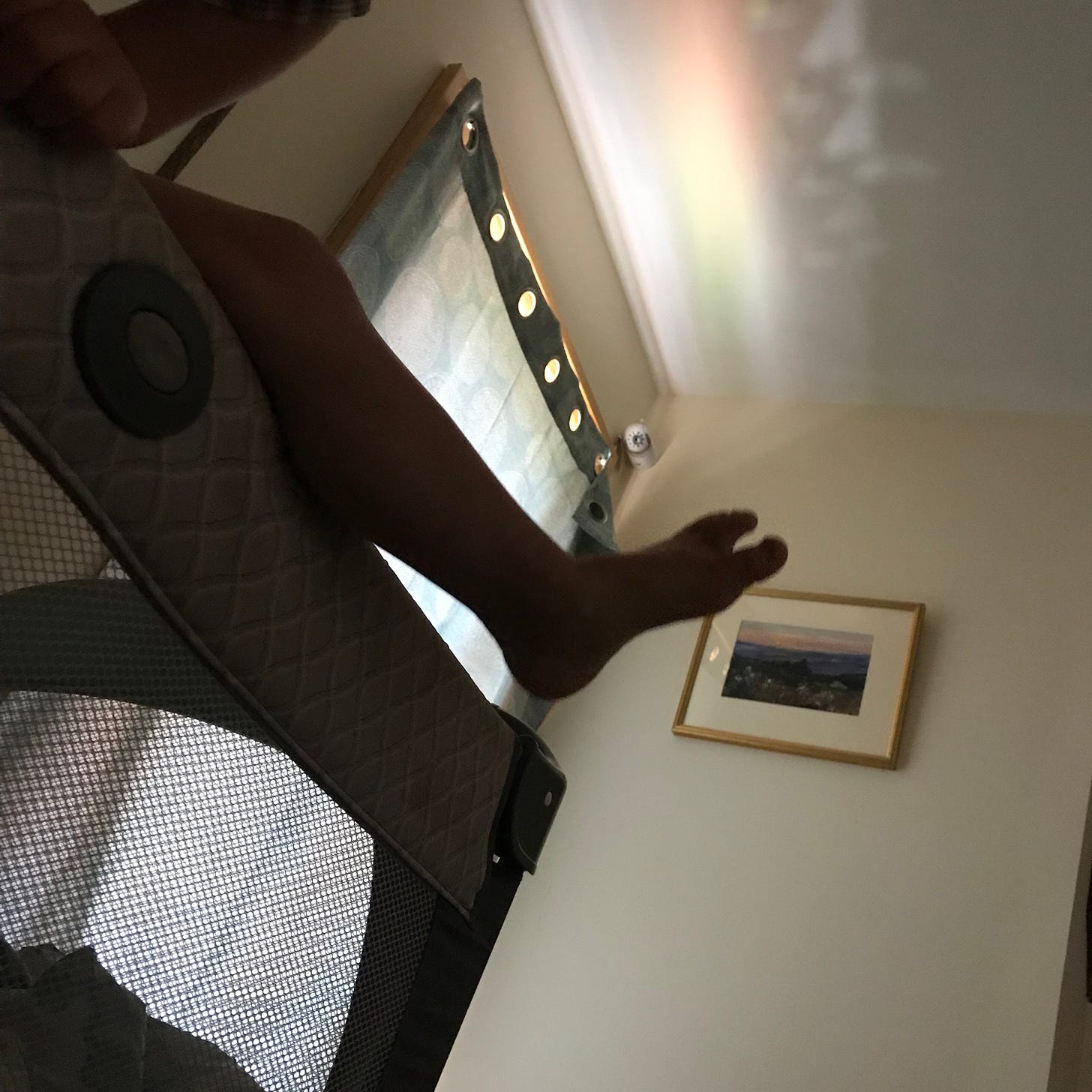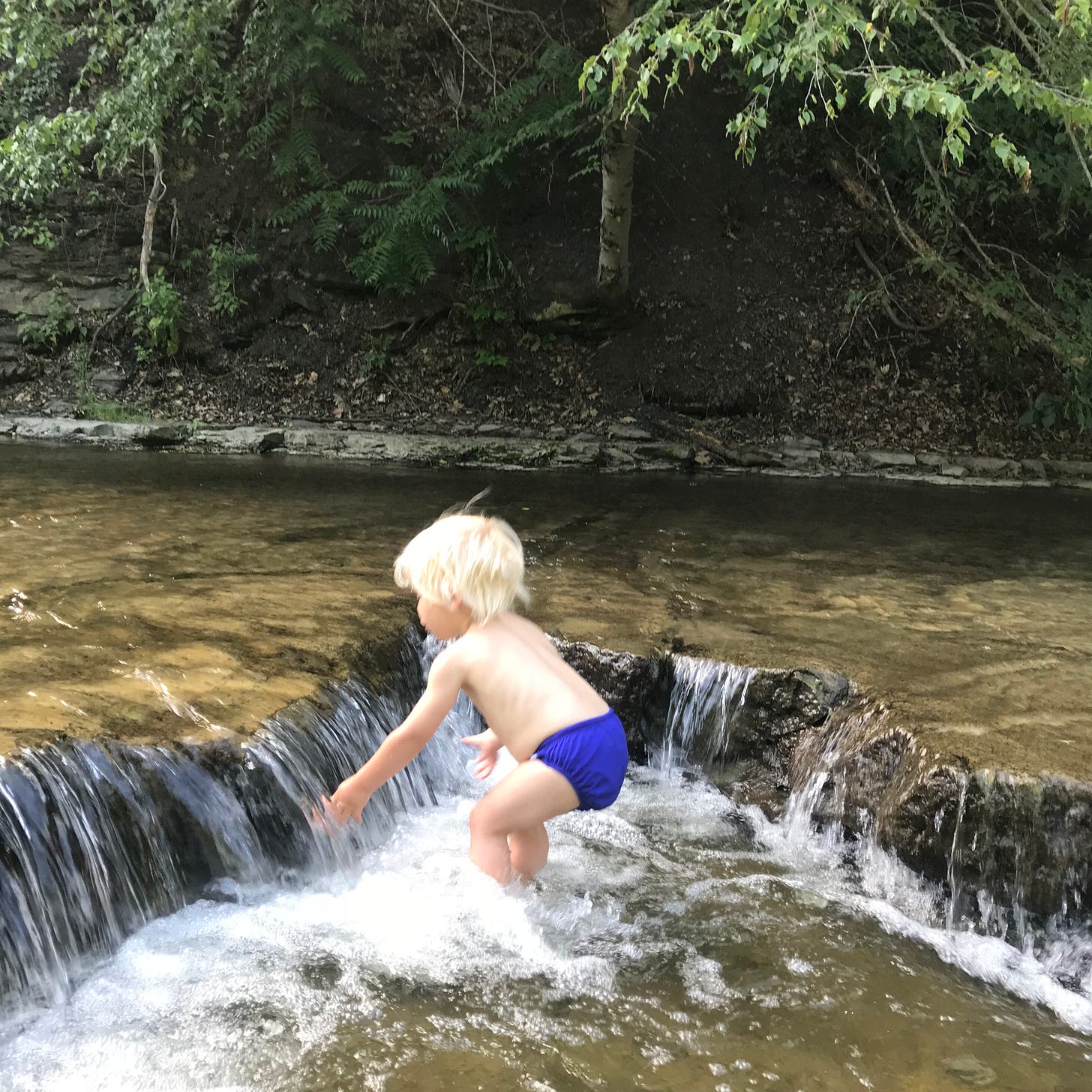Baby A went to sleep peacefully, after two absurd demands: 1) “More milk!” accompanied by the broiling sound of her shaking her completely full sippy-cup, and 2) “Miss Wumfus!” (Miss Rumphius), the only book in the room buried somewhere inside her brother’s sleeping pen, which looks like the epicenter of a firecracker incident.
I lay in position between two cribs, poking Baby B’s insistent foot back down every time it breached the railing.*
This went on for a few years. I resorted to fake-sleeping, and he called my bluff. Twenty-seven pounds of human came flying over the rail onto my person. But somehow he landed in an excellent position for me to execute, almost without having to think, a move that I will call “the ratcheting tie-down”:
I threaded his feet between my knees, hugged his body and said, “we’re going to sleep.” He tried to wiggle free for a moment, during which time I snugged him in tighter, and then… he was asleep. Drooling.
All it took was being hogtied.
I told this story to a writer friend who sympathized with the little fellow. She remembered being expected as a child to leave her parents’ dinner parties to go to bed, and thinking but I don’t want to miss any of this! It sounded too familiar. For Baby B, everything is that party. “SO BOOFUL!” he says, of flowers, the moon, a button-down shirt I found for him at Salvo. All sorts of things I take for granted he gives titles like “WEAL PWITTY,” “SO NICE,” and “WOW, SO BIGGER!”
One of the side-effects of having such enormous capacity for appreciation and excitement is that this child often suffers from a terrible case of FOMO. He whips himself into a froth over misunderstandings and disappointments—those moments when he can smell joy around the corner and something, usually me, impedes his progress. He sometimes even lies prone and bangs his head on the floor in despair.
Naptime can be especially hard, with lawns being mowed and mail-trucks delivering the junk mail he loves to carry etc. But apparently if you corral him firmly into one option—create the only option with your body itself— the part of him that knows what he needs (in addition to what he desires) works its flooding magic, and he goes out peacefully with the tide.
Perhaps not surprisingly, this child’s mother also suffers from FOMO. Mine, though, is about the parts and versions of me that have happened in the past, or may yet happen. For example, I used to be a Bird Walk Guide at the Cornell Lab of Ornithology. On my CV, I still am (“2015-present”). I haven’t yet managed to strike that little word, “present.” Apparently I harbor a fear that when I do, I will lose a part of myself. This, of course, is gobbledygook.
The same friend who remembered so clearly the childhood struggle of leaving her parents’ dinner parties (who is also, no surprise, a skilled & gifted writer & writing coach) pointed out recently that instead of saying “I used to be X,” I can say “I did X for a while, and now I do Y.”
The former is an identity or definition; the latter is an action or state of being. When I believe that “Bird Walk Guide” is an identity I once had, it’s easy also to believe that I am no longer that thing. However, if I classify “Bird Walk Guide” as a skill, or an action I used to perform, it can be revisited and re-engaged—in different forms, perhaps, and to different degrees, but also for a wider range of purposes.
Just last week, after having given up hope of reassembling the necessary synapses to identify a bird ever again, I took some friends on a bird walk at Sapsucker Woods, my old stomping grounds. To my great pleasure, much of my internal script was still accessible to me, even from within the moldy yogurt-smear my short-term memory has become.
I did X for a while, and now I’m doing Y.
It’s been especially helpful as I emerge from my children’s infancy to deploy this kind of thinking, which one could call “seasonal thinking” (as in: this is a particular season of my life in which I do certain things more than others, like excavate pine needles from my children’s butt-cracks).
While I do what sometimes feels like languishing in Y (parenting small children), it’s nice to begin to see that X (everything else I’ve ever done) and Z (things I might someday do) still come to call. When I’m feeling like a smashed PBJ in a hot car-seat, I begin to believe that caring for small humans is as endless as it sometimes feels, that I must mourn for what’s past and give up on things I used to dream of doing someday, because someday can’t possibly still exist.
But then, my aspirations tuck my feet between their capable knees, and memories of all I’ve done thus far wrap me in a firm hug. While I try to wriggle free from this kindness and resume my fretting, my past and future selves speak in unison, summoning the one sweet-ass piece of wisdom almost every human I know needs to hear more often: Hey, you really need a nap.
When I wake up, the present moment unfurls. It smells like the lavender Baby A has bogarted from the garden and stuffed in her overalls pocket, the blueberries Baby B ground into the rug while he shouted “LOOK! SO PURPLE! BOOFUL!”
Here, in now-land, it’s time to fill a milk cup, get a new book, and help a sweaty child do his post-nap vault from the crib (he’s still wobbly from sleep). It’s time to take twenty minutes to walk down the stairs together.
You see, we go slowly, we must go slowly, because there are several wandering ants to track, and some of the parrots’ food pellets are lying around, un-swept. These are really good finds. They must be collected and eaten immediately, for the tremendous delicacy they are.






As always, you have struck a chord within me and many others I’m sure! A very helpful guide to reframing that anxiety producing FOMO with a healthy dose of humor sprinkled throughout! Loved it.